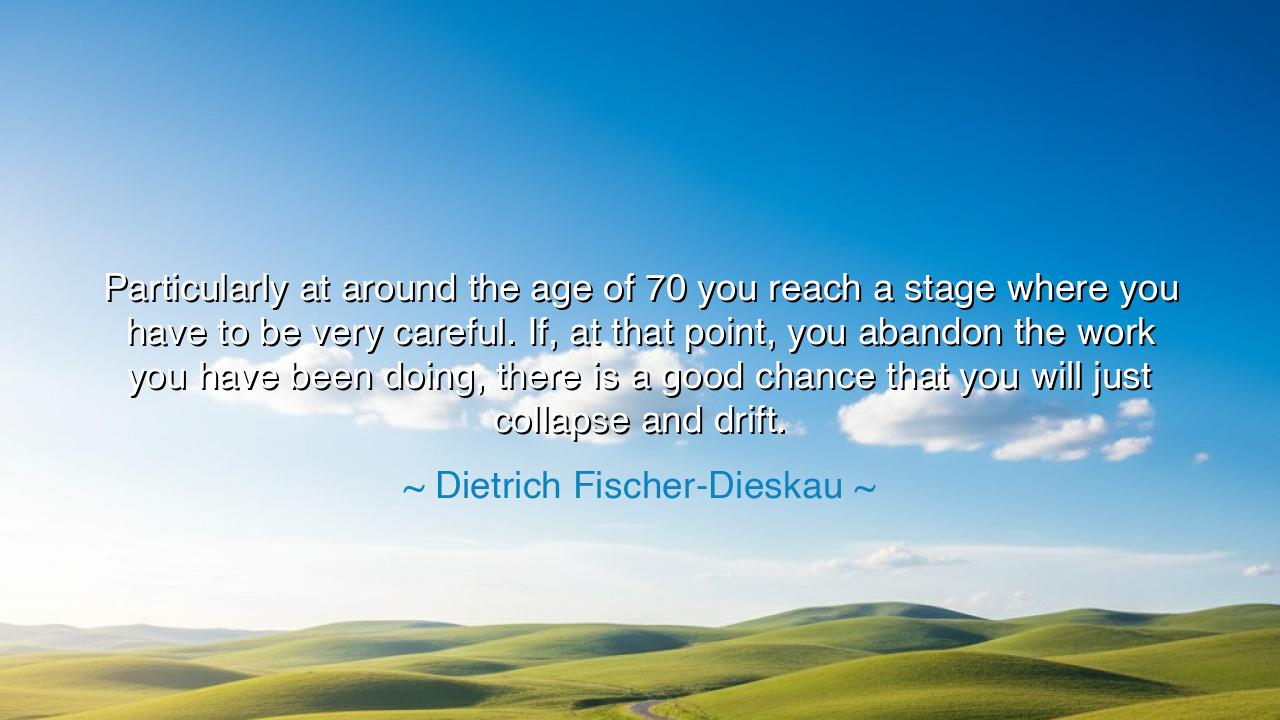
Particularly at around the age of 70 you reach a stage where you
Particularly at around the age of 70 you reach a stage where you have to be very careful. If, at that point, you abandon the work you have been doing, there is a good chance that you will just collapse and drift.






"Particularly at around the age of 70 you reach a stage where you have to be very careful. If, at that point, you abandon the work you have been doing, there is a good chance that you will just collapse and drift." These words, spoken by the legendary Dietrich Fischer-Dieskau, resonate with a timeless truth that echoes through the ages. They speak to the very core of human existence, for in them, we find the wisdom of one who understands that the passage of time is not merely a matter of age, but of purpose, meaning, and the critical importance of continued vitality in our later years.
At the age of 70, a threshold that many deem the beginning of elderhood, there lies a danger, not of age itself, but of what we do with the years we have. When a person reaches this stage, it is easy to abandon the passions and labors that have defined much of their life. They may retreat into a quietude, perhaps believing that their work is finished, that they are no longer needed. But to abandon one's purpose is to risk slipping into the abyss of drifting, to lose the anchor that has kept them grounded, and to find themselves adrift on the sea of time without direction or meaning. Fischer-Dieskau’s insight is a call to arms against this surrender, urging us to hold onto the work that gives us life, even as the years pass.
Consider the great example of Socrates, the father of philosophy, who, in his twilight years, continued to teach and to engage with the world around him. Even when society labeled him an old man, no longer relevant, Socrates did not yield to the temptation of withdrawal. His work was his life, and in his philosophical pursuits, he found the spark that kept his soul alive. Even when facing death, he did not abandon his calling, but chose instead to meet it with clarity and resolve, for he knew that the purpose of life was not to retreat but to continue to engage, to question, and to grow, regardless of one's age.
In the realm of the arts, another profound example comes to mind: the remarkable Leonard Cohen, who, in the final years of his life, produced some of his most profound and revered works. Despite being well into his 70s, Cohen’s creativity never faltered. Instead, he embraced the maturity of age, channeling his experiences, his struggles, and his joys into his music. His final album, You Want It Darker, is a reflection of a man who refused to let the years diminish his sense of purpose. Instead, he leaned into the inevitability of age, allowing it to enrich his work and deepen his connection to the world. Cohen’s refusal to "drift" is a testament to the power of dedication, and his legacy reminds us that the end of one journey does not mark the end of meaning or contribution.
Dietrich Fischer-Dieskau’s words caution us, then, not against the aging process itself, but against the danger of losing our connection to the things that give our lives meaning. The years will come, and with them, the physical limitations that remind us of our human fragility. But it is in our work—whether it be creative, intellectual, or personal—that we find the strength to endure. The true tragedy is not in the slowing of our bodies, but in abandoning what has sustained us for so long. The drifting that Fischer-Dieskau speaks of is the very threat of losing our purpose, of surrendering to the belief that we have nothing left to contribute.
The lesson is clear, then: stay connected to your purpose, no matter how the years advance. As you age, it is not time to retreat into the shadows, to bow out of the world’s stage. Rather, it is time to lean deeper into the work that has shaped you. Nurture your passions, whatever they may be, and continue to pour yourself into them. Age brings with it a well of experience, wisdom, and insight—qualities that, when harnessed, can continue to give life to your work in ways you may never have imagined in your youth. Your contribution is not measured by your age but by the passion with which you pursue it.
Let this be a guiding light: work is not merely a means to an end. It is the vessel through which we remain connected to the world, to others, and to the very essence of our being. As Fischer-Dieskau so wisely suggests, let us guard against the temptation to rest upon our laurels. Let us not collapse into passivity, but instead, embrace the future with vigor, knowing that our work, no matter the stage of life, is what gives us purpose. When you approach the years ahead, do so with grace and resolve, knowing that the best parts of your life may still be ahead of you, awaiting the fullness of your engagement.
In the end, the true gift of life lies not in the quantity of years, but in the quality of purpose we bring to each one. It is through our work—the labor of love, the pursuit of meaning—that we continue to live, to grow, and to enrich the world. Let us honor the wisdom of Fischer-Dieskau and the examples of those who came before us by never abandoning our calling, regardless of our age, for it is in our work that we find not only our legacy, but our immortality.






AAdministratorAdministrator
Welcome, honored guests. Please leave a comment, we will respond soon